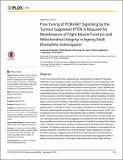Fine-Tuning of PI3K/AKT Signalling by the Tumour Suppressor PTEN Is Required for Maintenance of Flight Muscle Function and Mitochondrial Integrity in Ageing Adult Drosophila melanogaster
Author(s)
Davison, Claire; Fan, Shih-Jung; Morris, John F.; Goberdhan, Deborah C. I.; Wilson, Clive; Mensah, Lawrence; ... Show more Show less
DownloadMensah-2015-Fine-tuning of PI3K_.pdf (1.372Mb)
OPEN_ACCESS_POLICY
Open Access Policy
Creative Commons Attribution-Noncommercial-Share Alike
Terms of use
Metadata
Show full item recordAbstract
Insulin/insulin-like growth factor signalling (IIS), acting primarily through the PI3-kinase (PI3K)/AKT kinase signalling cassette, plays key evolutionarily conserved regulatory roles in nutrient homeostasis, growth, ageing and longevity. The dysfunction of this pathway has been linked to several age-related human diseases including cancer, Type 2 diabetes and neurodegenerative disorders. However, it remains unclear whether minor defects in IIS can independently induce the age-dependent functional decline in cells that accompany some of these diseases or whether IIS alters the sensitivity to other aberrant signalling. We identified a novel hypomorphic allele of PI3K’s direct antagonist, Phosphatase and tensin homologue on chromosome 10 (Pten), in the fruit fly, Drosophila melanogaster. Adults carrying combinations of this allele, Pten5, combined with strong loss-of-function Pten mutations exhibit subtle or no increase in mass, but are highly susceptible to a wide range of stresses. They also exhibit dramatic upregulation of the oxidative stress response gene, GstD1, and a progressive loss of motor function that ultimately leads to defects in climbing and flight ability. The latter phenotype is associated with mitochondrial disruption in indirect flight muscles, although overall muscle structure appears to be maintained. We show that the phenotype is partially rescued by muscle-specific expression of the Bcl-2 homologue Buffy, which in flies, maintains mitochondrial integrity, modulates energy homeostasis and suppresses cell death. The flightless phenotype is also suppressed by mutations in downstream IIS signalling components, including those in the mechanistic Target of Rapamycin Complex 1 (mTORC1) pathway, suggesting that elevated IIS is responsible for functional decline in flight muscle. Our data demonstrate that IIS levels must be precisely regulated by Pten in adults to maintain the function of the highly metabolically active indirect flight muscles, offering a new system to study the in vivo roles of IIS in the maintenance of mitochondrial integrity and adult ageing.
Date issued
2015-11Department
Massachusetts Institute of Technology. Department of Chemical Engineering; Koch Institute for Integrative Cancer Research at MITJournal
PLoS ONE
Publisher
Public Library of Science
Citation
Mensah, Lawrence B. et al. “Fine-Tuning of PI3K/AKT Signalling by the Tumour Suppressor PTEN Is Required for Maintenance of Flight Muscle Function and Mitochondrial Integrity in Ageing Adult Drosophila Melanogaster.” Ed. Kah-Leong Lim. PLOS ONE 10.11 (2015): e0143818.
Version: Final published version
ISSN
1932-6203